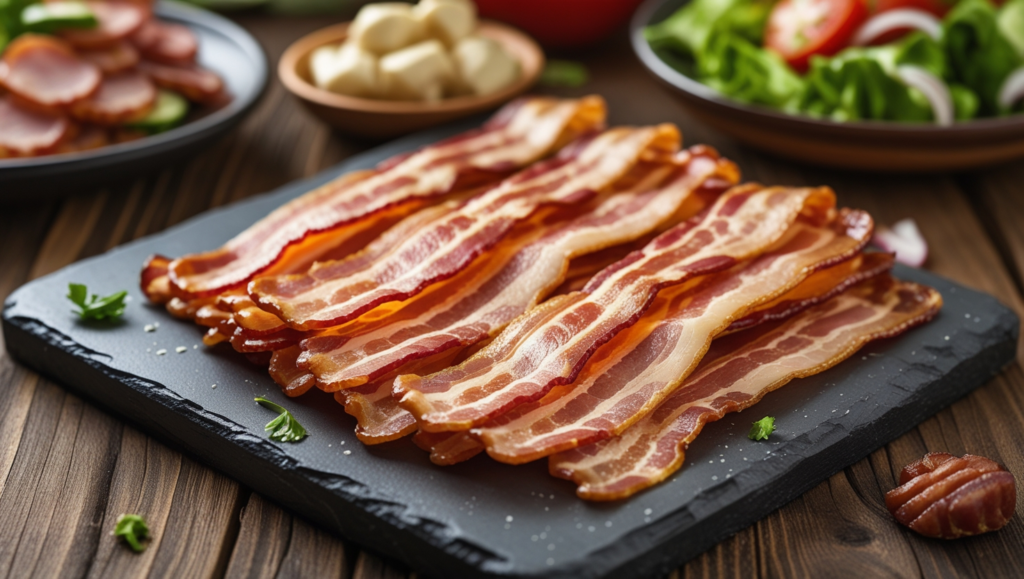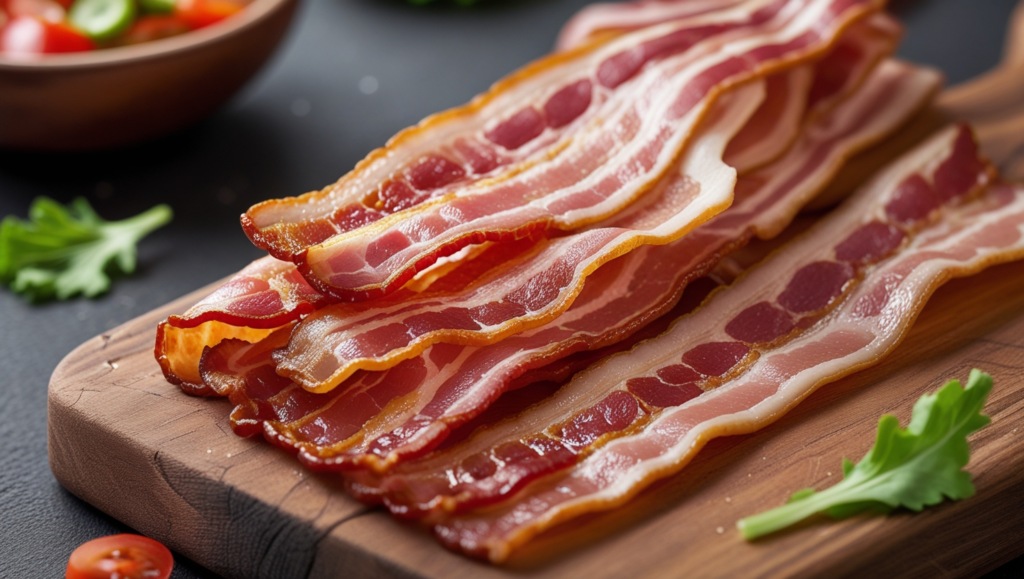I used to think bacon was off-limits for weight loss, but I found that including it in moderation actually helped keep me satisfied. It gave me the protein boost I needed without making me feel deprived, and surprisingly, I still lost weight!
Wondering if Is Bacon Good For Weight Loss? Discover how incorporating bacon in moderation can fit into a balanced diet and support your weight loss goals.
Stay tuned with us as we dive into the topic of ‘Is bacon good for weight loss?’ We’ll explore the facts and share helpful insights to help you make informed choices!
Is Bacon A Healthy Option For A Weight Loss Diet?
Bacon is high in fat and calories, which makes it less ideal for a strict weight loss diet. However, if eaten in moderation, it can fit into a balanced plan. Choosing leaner cuts, like turkey bacon, can reduce the fat content. It’s important to watch portion sizes, as eating too much bacon can easily add extra calories.
Bacon can also provide some vitamins and minerals, but it should not be the main food you rely on. It’s best to balance bacon with healthier options like vegetables and whole grains. So, while it’s not the healthiest food, moderation can make it work.
How Does Bacon Impact Weight Loss Goals?
Bacon’s high-fat and calorie content can make it harder to stay within your daily calorie limit for weight loss. However, it can still be part of your diet if you’re careful with portions. The fat in bacon can help keep you full, reducing overall hunger.

This can make it easier to control food intake, which is important for weight loss. It’s crucial to balance bacon with low-calorie foods like salads or vegetables. If consumed too frequently, bacon might lead to weight gain, so moderation is key.
Does Eating Bacon Affect Metabolism Or Fat Burning?
Impact on Fullness and Appetite Control
Bacon’s high protein and fat content helps you feel full for longer periods. This can curb hunger and prevent overeating, which is useful for weight loss. The fullness factor can help you stick to your daily calorie limit.
Saturated Fat and Metabolism
Bacon is rich in saturated fat, which, when consumed in excess, can slow down your metabolism. A slower metabolism means your body burns calories less efficiently. Over time, this could make fat loss more difficult.
Protein and Metabolic Boost
Bacon contains protein, which requires more energy for digestion, giving a small boost to your metabolism. This can aid in fat burning, but the effect is not significant enough to rely on alone. It’s just one small factor in a balanced diet.
Moderation is Key
While bacon can fit into your diet, eating it in large amounts can lead to excess calorie intake. Too much bacon can contribute to weight gain and slow down metabolism. Moderation ensures it doesn’t interfere with fat burning.
Balancing Bacon with Healthy Foods
Pairing bacon with nutrient-dense foods like vegetables, fruits, and whole grains helps keep your diet well-rounded. A balanced diet supports healthy metabolism and effective fat burning. Avoid relying solely on bacon for your nutrition.
Is Bacon A High-Protein Food For Weight Loss?
Yes, bacon does provide protein, which is important for weight loss and muscle maintenance. Protein helps you feel full longer, which can prevent overeating. However, bacon is also high in fat, which can add up in calories. If you’re focused on weight loss, consider limiting bacon to small portions while ensuring you’re getting protein from other sources like chicken, fish, or beans.

Bacon can contribute to your daily protein intake, but it shouldn’t be the primary protein source. Opting for leaner proteins will help you stay on track with your weight loss goals. So, bacon can be a protein option, but moderation is essential.
Is Bacon Good For Maintaining Muscle While Losing Weight?
Bacon can be helpful for maintaining muscle while losing weight because of its protein content. Protein is crucial for muscle repair and growth, especially when you’re on a calorie deficit. However, bacon is also high in fat, so it’s important to balance it with leaner protein sources like chicken or eggs.
Eating bacon occasionally can contribute to muscle maintenance, but it shouldn’t be your only protein source. For the best results, combine bacon with other nutrient-dense foods like leafy greens and whole grains. It’s all about finding the right balance to support both weight loss and muscle retention. Just keep an eye on portions to avoid excess fat intake.
FAQS:
Can I eat bacon and lose weight?
Yes, you can eat bacon in moderation and still lose weight, as long as it fits within your calorie limit. Just be mindful of portion sizes and balance it with healthier foods.
Is 2 slices of bacon a day bad?
Two slices of bacon a day can be okay if you’re mindful of your overall calorie and fat intake. It’s important to balance it with other nutrient-rich foods to maintain a healthy diet.
What is the best meat for weight loss?
Lean meats like chicken breast, turkey, and fish are the best choices for weight loss. They are lower in fat and calories while providing protein, which helps with muscle maintenance and satiety.
Is bacon high in calories?
Yes, bacon is high in calories due to its fat content. Eating large amounts can quickly add up in calories, so it’s best to enjoy it in moderation.
Can bacon be part of a low-carb diet?
Yes, bacon is low in carbohydrates, making it suitable for low-carb diets like keto. Just be cautious of the fat content and portion sizes.
Does bacon contain a lot of sodium?
Yes, bacon is high in sodium, which can lead to water retention and increased blood pressure if consumed in excess. Choose lower-sodium options when possible.
Conclusion
whether bacon is good for weight loss depends on how you incorporate it into your diet. While it can be enjoyed in moderation as part of a balanced meal plan, its high fat and calorie content make it important to keep portions small. For successful weight loss, it’s essential to balance bacon with nutrient-dense foods and focus on overall calorie control. So, if you’re mindful of how much you eat, bacon can be a satisfying addition, but it shouldn’t be the main focus of your weight loss strategy.












Discussion about this post